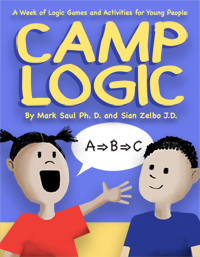- Home /
Give your feedback and ask questions about Camp Logic: Day One draft of a chapter

Camp Logic is a book for teachers, parents, math circle leaders, and anyone who nurtures the intellectual development of children. It is not necessary to have any mathematical background at all to use these activities – only to have a willingness to dig in and work toward solving problems where there is no clear path to a solution.
You can help us publish Camp Logic! Let your friends, colleagues, and the world know you want children to enjoy the underlying structures of math: share the crowdfunding page on your sites, blogs, and social media. Join the crowdfunding event to contribute money for editing, printing, and distributing the book, and to field test the activities. The book will by published in 2014, under an open Creative Commons license.
-- Mark Saul and Sian Zelbo, authors
The campaign reached its first milestone, so we are opening the draft of the first chapter for everyone's preview and discussion. It is attached to this post. Answer to share your thoughts, feedback, and questions for Mark and Sian!
Camp Logic Day One PDF
Please note that we will do layout (such as splitting into pages) and copy editing (for typos) later, after we incorporate reader comments. Now you get to see how a draft looks before the book is laid out!

Here are a few questions to get your feedback started!
- How good was the chapter overall? What caught your eye?
- Were there parts where you wished for more details?
- Were there confusing parts, problems you did not know how to start, or other roadblocks?
- Have you noticed anything we need to fix about spelling, grammar, and style? Any other comments to the editors?
- What do you think of illustrations?
- Do you feel you could run these activities with kids after reading? If not, what other support would you need?
- What do you think of this chapter? Do you have questions, comments, any feedback to the authors? Reply below!
People who like this
Your answer

Answer by szelbo · May 21, 2014 at 12:48 PM
To lfahlberg: Thank you for the suggestion! It is difficult to write problems that are easy but also interesting, so it's always nice to have another idea for a variation.
Answer by szelbo · May 21, 2014 at 12:45 PM
Hi Sheryl. Thank you for your question. In general the activities do not yet harder as the week progresses. The activities are modular, and the instructor should feel free to change the order of the modules in any way that makes sense. The order presented, however, has worked well, and thought was given to mixing up types of activities so that the children remain engaged and interested.
Answer by lfahlberg · May 21, 2014 at 11:25 AM
these are great. i am working thru problems so maybe this problem exists farther down. i read #3 incorrectly and solved ab=b+b+b and thot you might like it also. :)
Answer by sherylmorris · May 20, 2014 at 10:39 PM
I struggle with this but, can sense the importance.
Will the sequence of chapters be important to follow in order to build a logical mind? Are 'Day One' exercises the easiest?
Answer by marksaul · May 20, 2014 at 12:53 PM
I think we can distinguish between the nature of mathematical truth and the way we come to know that truth. The latter is in fact a process of trial and error, mimicking the empirical sciences. But mathematics has available to it the apparatus of logic, which allows us to go further and assert the internal consistency of what we have concluded.
By the same token, we might say that the empirical sciences are logic-driven, in that we often test our conclusions through a logical process. But that's not the final test in the sciences. It is observation that is the final test.
@username
Answer by brad · May 19, 2014 at 11:49 PM
"Mathematical truth is not empirical truth: it does not depend on experimentation and observation." This is not a true statement given the process that follows is about the obsevations of "pattern" and relationships discovering by exploration the consistant development of facts in a logical way given the context.
,

